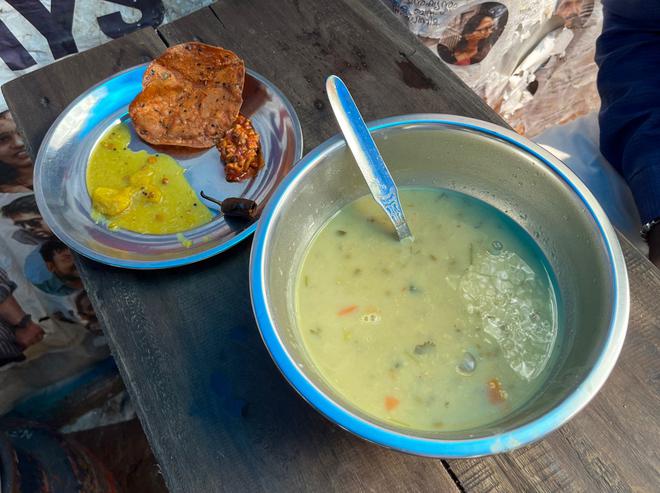If you think that tea-time snacks, thattudosa, porotta, puttu and their sides are crowd-pullers at roadside eateries, here is a surprise. Even kanji (gruel) has fans!
Especially the masala kanji served at a no-frills place at Chembu Panippura junction, at the beginning of the Kochar Road-Valiyasala stretch. Run by Sudesh Kumar, aka Vijayan to his customers, this eatery has been serving masala kanji for lunch for almost a year now. Except for a printed piece of paper that announces ‘masala kanji’, the tiny outlet does not even have a name. Ask for Vijayannan’s shop and masala kanji , plenty of people will guide you.
Despite being spicy, some customers make it spicier with homemade mango and lime pickles and sun-dried curd chilli. Crisp pappadavada (lentil flatbread fritter) is also served with the kanji. Flavourful chukku kappi (dry ginger coffee) is the signature drink here.

Vijayan is reluctant to divulge the ingredients that go into the gruel. “I use red rice and it is cooked in water boiled with cumin (jeeraka vellam). Among the ingredients are green gram and biryani masala ,” says Vijayan. As I had the piping hot masala kanji, I found grated carrot, beans and coriander leaves as well.
How it started
It was the pandemic that forced Vijayan, a lottery seller, to step into the food business. “I used to sell homemade idli and dosa batter for some time. After that I sold mashed tapioca and chilli with chukku kappi at this space. One day I made the masala kanji for myself. An autorickshaw driver who stopped by asked if he could also have it. Then, he brought another person with him to have the kanji and that’s how I started making the masala kanji for customers. Eventually, word got around and more people started coming in,” says 60-year-old Vijayan. Food vloggers brought in more customers.

Vijayan points out the kanji has to be cooked on low flame and so it is on the stove for three to three-and-half hours. “It has to be infused with the flavours of the ingredients. The kanji is ready by 12 noon and usually gets over by 4pm,” he says.
Since there are only two plastic stools, most customers stand and enjoy their kanji. “It feels good when people come from across the city to have my kanji. Some of them are regular customers. I believe that kanji is the healthiest food that one can have. It need not have so many ingredients.”
A bowl of masala kanji costs ₹40. Pappadavada is priced at ₹7 for one and the chukku kaappi ₹10.
The shop is closed on Sundays.







